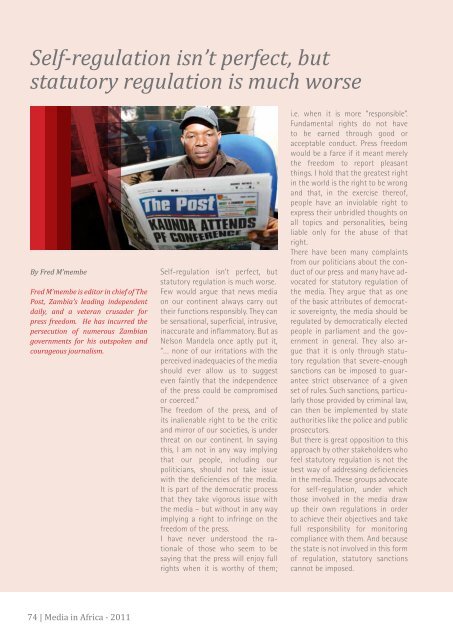Twenty years after the Windhoek Declaration on press freedom
Twenty years after the Windhoek Declaration on press freedom
Twenty years after the Windhoek Declaration on press freedom
You also want an ePaper? Increase the reach of your titles
YUMPU automatically turns print PDFs into web optimized ePapers that Google loves.
Self-regulati<strong>on</strong> isn’t perfect, but<br />
statutory regulati<strong>on</strong> is much worse<br />
By Fred M’membe<br />
Fred M’membe is editor in chief of The<br />
Post, Zambia’s leading independent<br />
daily, and a veteran crusader for<br />
<strong>press</strong> <strong>freedom</strong>. He has incurred <str<strong>on</strong>g>the</str<strong>on</strong>g><br />
persecuti<strong>on</strong> of numerous Zambian<br />
governments for his outspoken and<br />
courageous journalism.<br />
74 | Media in Africa - 2011<br />
Self-regulati<strong>on</strong> isn’t perfect, but<br />
statutory regulati<strong>on</strong> is much worse.<br />
Few would argue that news media<br />
<strong>on</strong> our c<strong>on</strong>tinent always carry out<br />
<str<strong>on</strong>g>the</str<strong>on</strong>g>ir functi<strong>on</strong>s resp<strong>on</strong>sibly. They can<br />
be sensati<strong>on</strong>al, superficial, intrusive,<br />
inaccurate and inflammatory. But as<br />
Nels<strong>on</strong> Mandela <strong>on</strong>ce aptly put it,<br />
“… n<strong>on</strong>e of our irritati<strong>on</strong>s with <str<strong>on</strong>g>the</str<strong>on</strong>g><br />
perceived inadequacies of <str<strong>on</strong>g>the</str<strong>on</strong>g> media<br />
should ever allow us to suggest<br />
even faintly that <str<strong>on</strong>g>the</str<strong>on</strong>g> independence<br />
of <str<strong>on</strong>g>the</str<strong>on</strong>g> <strong>press</strong> could be compromised<br />
or coerced.”<br />
The <strong>freedom</strong> of <str<strong>on</strong>g>the</str<strong>on</strong>g> <strong>press</strong>, and of<br />
its inalienable right to be <str<strong>on</strong>g>the</str<strong>on</strong>g> critic<br />
and mirror of our societies, is under<br />
threat <strong>on</strong> our c<strong>on</strong>tinent. In saying<br />
this, I am not in any way implying<br />
that our people, including our<br />
politicians, should not take issue<br />
with <str<strong>on</strong>g>the</str<strong>on</strong>g> deficiencies of <str<strong>on</strong>g>the</str<strong>on</strong>g> media.<br />
It is part of <str<strong>on</strong>g>the</str<strong>on</strong>g> democratic process<br />
that <str<strong>on</strong>g>the</str<strong>on</strong>g>y take vigorous issue with<br />
<str<strong>on</strong>g>the</str<strong>on</strong>g> media – but without in any way<br />
implying a right to infringe <strong>on</strong> <str<strong>on</strong>g>the</str<strong>on</strong>g><br />
<strong>freedom</strong> of <str<strong>on</strong>g>the</str<strong>on</strong>g> <strong>press</strong>.<br />
I have never understood <str<strong>on</strong>g>the</str<strong>on</strong>g> rati<strong>on</strong>ale<br />
of those who seem to be<br />
saying that <str<strong>on</strong>g>the</str<strong>on</strong>g> <strong>press</strong> will enjoy full<br />
rights when it is worthy of <str<strong>on</strong>g>the</str<strong>on</strong>g>m;<br />
i.e. when it is more “resp<strong>on</strong>sible”.<br />
Fundamental rights do not have<br />
to be earned through good or<br />
acceptable c<strong>on</strong>duct. Press <strong>freedom</strong><br />
would be a farce if it meant merely<br />
<str<strong>on</strong>g>the</str<strong>on</strong>g> <strong>freedom</strong> to report pleasant<br />
things. I hold that <str<strong>on</strong>g>the</str<strong>on</strong>g> greatest right<br />
in <str<strong>on</strong>g>the</str<strong>on</strong>g> world is <str<strong>on</strong>g>the</str<strong>on</strong>g> right to be wr<strong>on</strong>g<br />
and that, in <str<strong>on</strong>g>the</str<strong>on</strong>g> exercise <str<strong>on</strong>g>the</str<strong>on</strong>g>reof,<br />
people have an inviolable right to<br />
ex<strong>press</strong> <str<strong>on</strong>g>the</str<strong>on</strong>g>ir unbridled thoughts <strong>on</strong><br />
all topics and pers<strong>on</strong>alities, being<br />
liable <strong>on</strong>ly for <str<strong>on</strong>g>the</str<strong>on</strong>g> abuse of that<br />
right.<br />
There have been many complaints<br />
from our politicians about <str<strong>on</strong>g>the</str<strong>on</strong>g> c<strong>on</strong>duct<br />
of our <strong>press</strong> and many have advocated<br />
for statutory regulati<strong>on</strong> of<br />
<str<strong>on</strong>g>the</str<strong>on</strong>g> media. They argue that as <strong>on</strong>e<br />
of <str<strong>on</strong>g>the</str<strong>on</strong>g> basic attributes of democratic<br />
sovereignty, <str<strong>on</strong>g>the</str<strong>on</strong>g> media should be<br />
regulated by democratically elected<br />
people in parliament and <str<strong>on</strong>g>the</str<strong>on</strong>g> government<br />
in general. They also argue<br />
that it is <strong>on</strong>ly through statutory<br />
regulati<strong>on</strong> that severe-enough<br />
sancti<strong>on</strong>s can be imposed to guarantee<br />
strict observance of a given<br />
set of rules. Such sancti<strong>on</strong>s, particularly<br />
those provided by criminal law,<br />
can <str<strong>on</strong>g>the</str<strong>on</strong>g>n be implemented by state<br />
authorities like <str<strong>on</strong>g>the</str<strong>on</strong>g> police and public<br />
prosecutors.<br />
But <str<strong>on</strong>g>the</str<strong>on</strong>g>re is great oppositi<strong>on</strong> to this<br />
approach by o<str<strong>on</strong>g>the</str<strong>on</strong>g>r stakeholders who<br />
feel statutory regulati<strong>on</strong> is not <str<strong>on</strong>g>the</str<strong>on</strong>g><br />
best way of addressing deficiencies<br />
in <str<strong>on</strong>g>the</str<strong>on</strong>g> media. These groups advocate<br />
for self-regulati<strong>on</strong>, under which<br />
those involved in <str<strong>on</strong>g>the</str<strong>on</strong>g> media draw<br />
up <str<strong>on</strong>g>the</str<strong>on</strong>g>ir own regulati<strong>on</strong>s in order<br />
to achieve <str<strong>on</strong>g>the</str<strong>on</strong>g>ir objectives and take<br />
full resp<strong>on</strong>sibility for m<strong>on</strong>itoring<br />
compliance with <str<strong>on</strong>g>the</str<strong>on</strong>g>m. And because<br />
<str<strong>on</strong>g>the</str<strong>on</strong>g> state is not involved in this form<br />
of regulati<strong>on</strong>, statutory sancti<strong>on</strong>s<br />
cannot be imposed.












